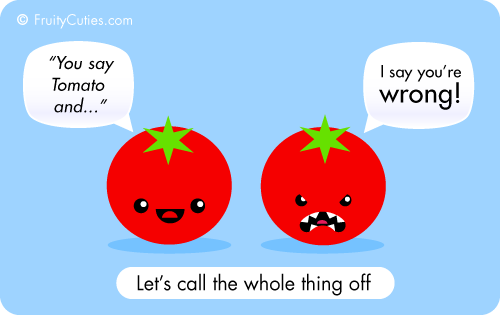Lingua et Dialectus
Photo Credit FruityCuties.com
The English language is ever evolving. The American English language also borrows phrases from other languages. For example, most people would understand 'adieu', 'au revoir', 'adios', and 'ciao', which all mean 'goodbye' due to pop culture. That being said, the type of language that is spoken varies with who else is involved. In a professional setting, like school or work, it is expected that the words being used are grammatically correct and proper for the occasion. Meanwhile, for friends and family, the language that is used is more relaxed. A lot of people, especially if they are multilingual, end up mixing languages, but it is understood by their respective audience. This is even how modern English came to be.
~~~~~~~~~~~~~~~~~~~~~~~~~~~~~~~~~~
English comes in different forms as well. Depending on where they are from, people use different variations of the language. There are also many different dialects. People try to argue that "ain't" is not a word, but it is recognized as one by many. A person from the United States might not recognize the use of "innit", but someone from the U.K. could.There is a difference between a dialect and an accent, however. The Oxford English Dictionary states that "A common mistake is to confuse a ‘dialect’ with an accent, muddling up the difference between words people use and the sounds they make, their pronunciation. If vocabulary and grammar are being considered alongside pronunciation, then ‘dialect’ is a reasonable term to use. But often, when claiming to discuss a dialect, someone will concentrate just on pronunciations. If what is being spoken about are sounds alone—that is, accent—then the area of language study is rather pronunciation, or phonology."
~~~~~~~~~~~~~~~~~~~~~~~~~~~~~~~~~~~~~~~
According to PBS, "Social scientists estimate the number of U.S. dialects range from a basic three - New England, Southern and Western/General America - to 24 or more. Some researchers go so far as to suggest it's actually impossible to count the number of dialects in the United States because under a loose definition of the term, thousands of cities, towns, and groups have their own varieties or dialects." Included in the video below is the different ways Americans refer to a soda/pop/coke. This debate is to show the various dialects in the United States.According to Western Washington University, "most dialectologists, however, believe that dialects are here to stay, since they are acquired from parents at an early age. Thus the well established regional dialects of American English are not disappearing. In fact, the western, "leveled" English is itself showing signs of dialect genesis. So the history of American English and of English is far from over."

Hi,
ReplyDeleteYour blog post overall was composed quite nicely, grammatically, and through your use of tone. I think what I liked most about it was your short snip it of video at the end. It really opens your eyes to how different dialect can be when going from region to region and state to state. Your overall for your conclusion was also very insightful in stating that Americas English will continue to evolve. Its a very agreeable and data driven post.
Thank you,
Abigail Horton
This is an interesting and informative post. People seem to forget that we get so many of our common words from other languages. For example, pajamas (Persian), or assassin (a combination of French, Medieval Latin, and Arabic). Even the acronym "RSVP" that is used all across American in invitations is from the French "répondez s'il vous plaît" (French for "respond please"). Maybe one could make an argument that without immigration and word adoption (in some ways), our language would just not be all that interesting?
ReplyDelete